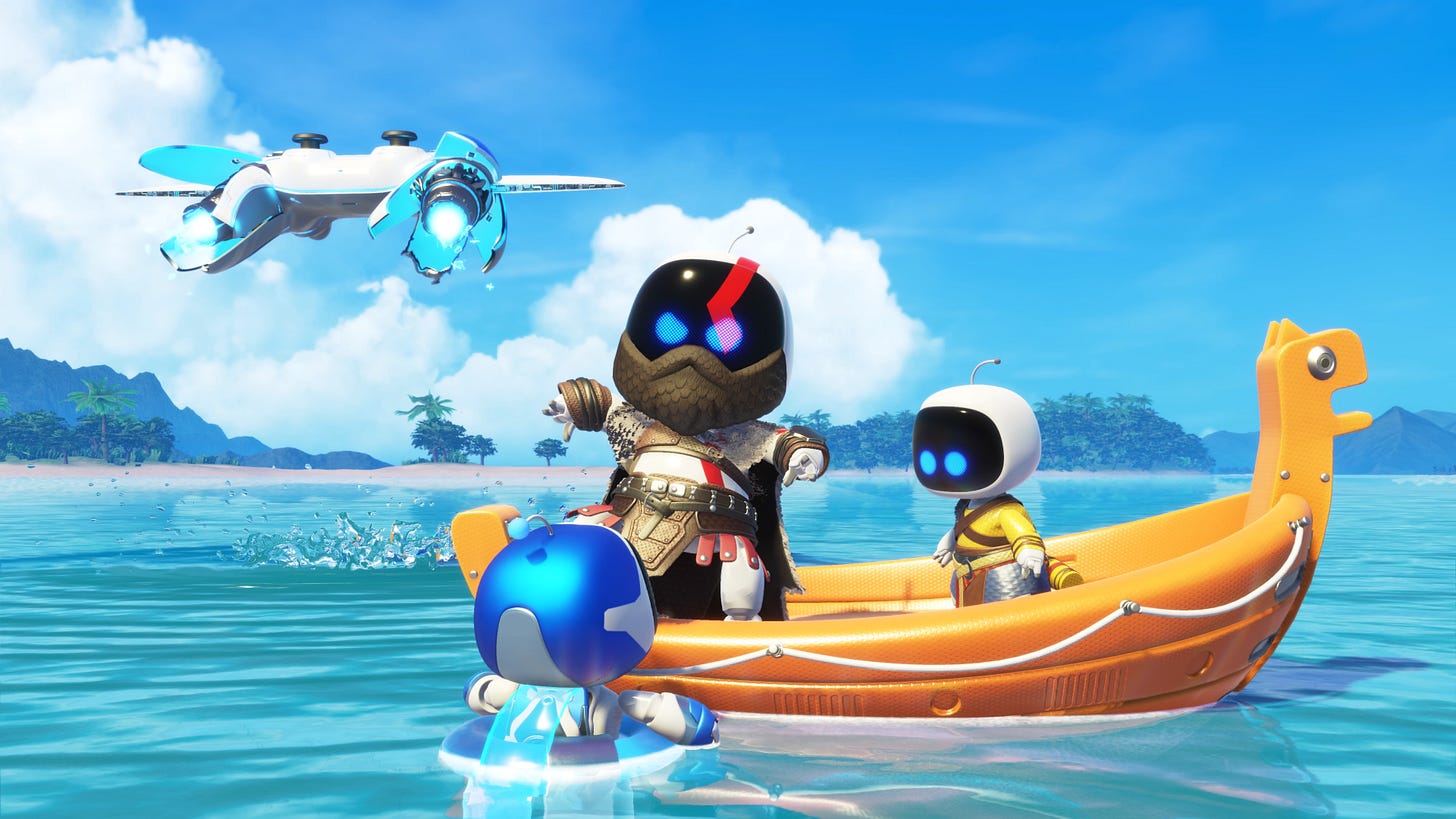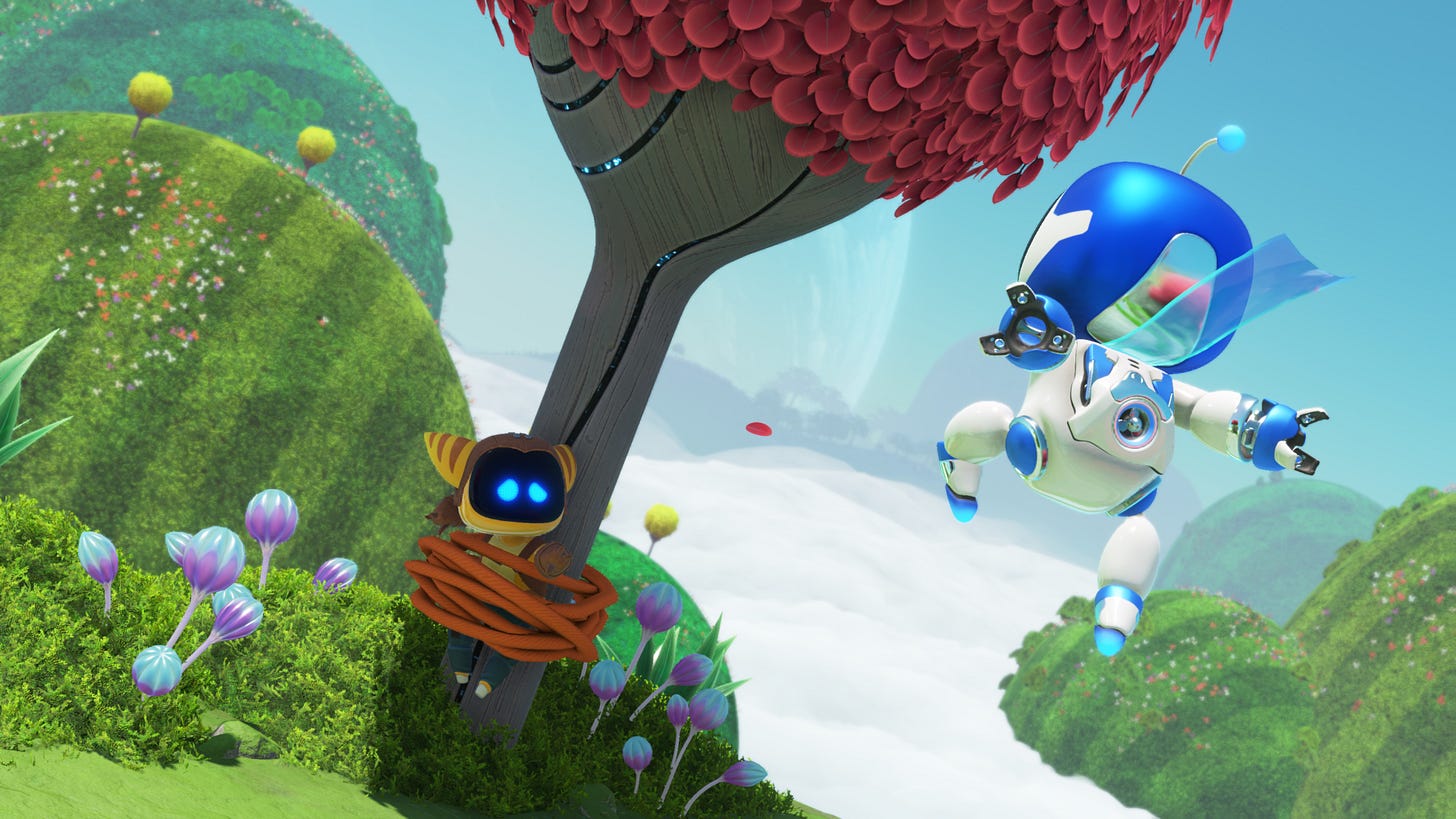Astro Bot, reviewed, and Echoes of Wisdom, previewed
A new chapter for Zelda and the best Nintendo game Nintendo never made
It’s the best of times and worst of times for Sony. This week, the company announced the closure of the multiplayer shooter Concord less than a month after its release — a flop that cost the company untold millions. Days later, the less grandiose but far more impressive Astro Bot scored a rapturous 94 on Metacritic. I hadn’t planned to review the platformer personally, but it so deeply ensorcelled me that I sped through it by the embargo deadline and wrote up my experience on WBUR.org:
I first encountered the game’s robot hero in Astro’s Playroom, a free PS5 tech demo that showed off its hardware innovations by setting the gameplay inside a fantastical PS5 itself, with its various systems (cooling, memory, storage, etc.) serving as unique levels. Four years later, Astro Bot imagines that console as a spaceship beset by an alien bully who steals its parts and flings its robot crew across dozens of planets.
If the game wasn’t so exquisitely crafted it’d be hard to forgive this shameless self-promotion. Your little metal feet cause different sound effects to play from the controller’s built-in speaker depending on the surface they’re running on. The triggers adapt to whatever you’re pushing or pulling, giving each object and power-up a distinct texture. Far into the PS5’s lifespan, Astro Bot and its Playroom predecessor are still among the few games to fully utilize this haptic feedback.
A peerless attention to detail also elevates the hunt for lost crew members. These bots dance and squeal when you find them, and many come dressed as characters from PlayStation’s three-decade history — Metal Gear Solid, God of War, Demon’s Souls, Uncharted, The Last of Us, Horizon — the range extends well beyond my brand knowledge. Even though I didn’t get all the references, their sheer variety spurred me to ferret out 289 bots out of the total 300!
Mutually reinforcing systems reward this completionism. Bots unlock boss stages and populate your home base (like the Waddle Dees you liberate in Kirby and the Forgotten Land). When they’re not linking limbs to form bridges, ladders and ramps to help you explore the hub world, they’ll assemble by your downed spaceship. Mostly, they just stand around, but you can spend collectible coins to draw randomized items for them, which come with new animations. I was lucky enough to score Pyramid Head’s colossal sword, for example. Smack him and he’ll toss it skyward in surprise, only for it to crash back down on top of him. I adore these slapstick easter eggs and very much wanted to catch ‘em all.
But even though I discovered every secret planet and bested every boss in about 16 hours, the game’s most vicious challenge levels dashed my hopes for 100% completion. Here, the game betrays an arbitrary sadism at odds with its otherwise forgiving design. Thankfully, the rest of the game was a romp as expansive as Super Mario Galaxy and nearly as brilliant as Super Mario Odyssey. Astro Bot might be a glorified advertisement for all things PlayStation, but it’s also the best Nintendo game Nintendo never made.
Read the full article to also catch my colleagues’ takes on The Casting of Frank Stone and Warhammer 40,000: Space Marine 2.
Also, as promised, I published my preview of The Legend of Zelda: Echoes of Wisdom on NPR.org. I’m very eager to explore more than the carefully-guarded 80 minutes Nintendo permitted me play:
In a series that has long balanced tradition with innovation, Echoes of Wisdom is the most significant revision to its classic, top-down gameplay since 2013’s A Link Between Worlds. Where that 3DS title allowed players to acquire Link’s gear (hookshot, bow, hammer, etc.) in a non-linear order, Echoes (almost) entirely ditches the typical arsenal.
Enter the titular echoes — copies of objects you’ll collect around the world. I started my hands-on demo in a prison, locked away by a wicked imposter king. While I could only summon three items at a time (you can later discover more slots), I quickly slipped my captors by arranging beds to climb over obstacles and crates to box in patrolling guards.
After slithering through the sewers, Zelda disguised herself in a cloak Link left behind and began her incognito quest. Townsfolk believed her to be the cause of mysterious purple rifts that opened across the land, swallowing loved ones and blocking pathways across a classic 2D landscape that resembles the map from 1991’s A Link to the Past. Here, the game opened up — and so did the echoes.
You don’t just copy items — you can clone defeated enemies as well. I frequently summoned swarms of bat-like Keese to harass adversaries while I conjured and catapulted rocks from a safe distance. Eventually, I stumbled upon a seed-shooting helicopter plant, bested it, and then deployed it not only for aerial bombardments but also to traverse previously unreachable areas.
These echoes combine with other powers to solve puzzles in dizzying ways. After jumping into a rift myself, the game introduced me to the Bind and Reverse Bind abilities, which allowed me to leash an item or enemy to follow my movements or vice-versa. I used it to tether myself to moving platforms in the dungeon’s frequent side-scrolling rooms that reminded me of Link's Awakening and Zelda II: The Adventure of Link.
Speaking of Link, the big surprise of the preview came after I beat a shadowy version of him and unlocked a “Swordfighter” form that allows Zelda to attack directly, at the cost of a gradually depleting energy meter. It’s the converse of the magic Link spent to cast spells, and the game lets you use it so infrequently that you’ll likely have to dispatch most enemies through echoes and other means.
Nintendo had me play through the introductory prison break, an early dungeon, and a small patch of the game’s (relatively open) world. I have only one gripe: You’ll switch between echoes through a long line in a pause menu, akin to the Fuse power interface in Tears of the Kingdom. I quickly tired of scrolling and relied on sorting items by “Most Recent” and “Most Used,” consigning other handy echoes to oblivion.
However, this annoyance hardly diminishes the achievement Echoes of Wisdom is shaping up to be. While the game’s story appears to be a simple inversion of the “Knight saves Princess” trope, its mechanics add astonishing depth and variety to a decades-old formula. Where Tears of the Kingdom felt like a triumphant end of an era, Echoes of Wisdom may well be an understated but confident start of something new.
Finally, Vinny Acovino at All Things Considered produced a glorious three minutes on the cultural background to Black Myth: Wukong, and the stellar Quintin Smith released a fascinating video essay on military funding in game design. I live within walking distance of the Pentagon so nothing he discussed surprised me, but it’s intriguing stuff and well worth a watch:
Here & Now Mastromarino Highlights
In 'Soft Power' musical, playwright David Henry Hwang tackles racism, U.S.-China relations — had a tremendous time putting this sound-rich interview together with host Scott Tong, though we agree that Soft Power’s surreal camp succeeds more than its attempts at sincerity.
Long-time aide to New York governor charged with secretly working with China — life imitates art, I guess!
Suspect in Georgia school shooting to appear in court Friday
More than 160,000 children in Gaza have received Polio vaccinations, UNWRA says





